|
|
|
Sort Order |
|
|
|
Items / Page
|
|
|
|
|
|
|
| Srl | Item |
| 1 |
ID:
169919
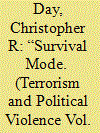

|
|
|
|
|
| Summary/Abstract |
To date, scholarly work on armed groups has seldom considered the notion of rebel resilience, or the factors that enable these groups to survive despite time, military pressure, and the myriad contingent events of civil war. In an effort to develop an explanatory framework for resilience as a distinct outcome of civil war and rebellion, this article examines the conditions under which the Lord’s Resistance Army (LRA) has persisted for nearly three decades. Based on fieldwork and original research, the article explains the LRA’s resilience in light of the group’s organizational structure and resource self-sufficiency, which have been well suited for the borderlands of East and Central Africa. The LRA is a key case of rebel resilience. It is important because it sheds light on the organizational foundations of armed groups, the relationship between resources and rebellion, and the broader study of conflict duration and termination. Understanding the sources of the LRA’s resilience can inform efforts to end such insurgencies.
|
|
|
|
|
|
|
|
|
|
|
|
|
|
|
|
| 2 |
ID:
159772
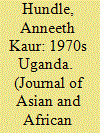

|
|
|
|
|
| Summary/Abstract |
This paper explores the ongoing presence of the 1972 expulsion of the racialized Asian population by former president Idi Amin in contemporary Uganda. The expulsion was a “critical event” and thus the paper uses an “anthropology of the event” approach to focus on the architecture of silence and historical consciousness of the event in urban Kampala. The four arenas of focus are: (1) official state narratives; (2) community mobilization and public forums on urban African-Asian relations; (3) memories, adventure tales, and narratives expressed by Ugandan Asian men; and (4) the infrastructure and material culture of 1970s Asian property expropriation.
|
|
|
|
|
|
|
|
|
|
|
|
|
|
|
|
| 3 |
ID:
131509
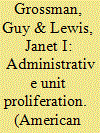

|
|
|
|
|
| Publication |
2014.
|
| Summary/Abstract |
Numerous developing countries have substantially increased their number of subnational administrative units in recent years. The literature on this phenomenon is, nonetheless, small and suffers from several theoretical and methodological shortcomings: in particular, a unit of analysis problem that causes past studies to mistakenly de-emphasize the importance of local actors. We posit that administrative unit proliferation occurs where and when there is a confluence of interests between the national executive and local citizens and elites from areas that are politically, economically, and ethnically marginalized. We argue further that although the proliferation of administrative units often accompanies or follows far-reaching decentralization reforms, it likely results in a recentralization of power; the proliferation of new local governments fragments existing units into smaller ones with lower relative intergovernmental bargaining power and administrative capacity. We find support for these arguments using original data from Uganda.
|
|
|
|
|
|
|
|
|
|
|
|
|
|
|
|
| 4 |
ID:
185514
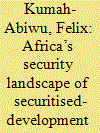

|
|
|
|
|
| Summary/Abstract |
Africa’s security landscape has been experiencing securitised-development practices through counterterrorism activities from donor countries engaged in the ‘Global War on Terror’ (GWOT). While some African governments continue to ‘benefit’ from the securitised-development agenda, critiques argue that there are human rights concerns that are connected to the practice of securitised-development. They have emphasised how some African governments and military actors involved in fighting the GWOT are also faced with human rights issues. To explore these issues, the article examines the securitised-development agenda in Kenya and Uganda and its impact on human rights. The article argues that the securitised-development practice is characterised by underlying contradictions involving the fight against terrorism and the accompanying human rights concerns in these countries.
|
|
|
|
|
|
|
|
|
|
|
|
|
|
|
|
| 5 |
ID:
040513


|
|
Amin
/ Listowel, Judith
|
1973

|
|
|
|
| Publication |
Dublin, IUP Books, 1973.
|
| Description |
188p.Hbk
|
| Standard Number |
0716521970
|
|
|
|
|
|
|
|
|
|
|
|
Copies: C:1/I:0,R:0,Q:0
Circulation
| Accession# | Call# | Current Location | Status | Policy | Location |
| 012719 | 923.16761/LIS 012719 | Main | On Shelf | General | |
|
|
|
|
| 6 |
ID:
191680
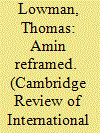

|
|
|
|
|
| Summary/Abstract |
This article explores the role of human rights discourse in reframing the changing diplomatic relationship of the United Kingdom and Uganda during Idi Amin’s dictatorship of 1971-1979. The emergence of a violent military dictatorship in Uganda in the early 1970s posed difficult questions for Britain, which had played a central role in the creation of the Ugandan nation-state in the colonial era and maintained many connections to it. In the first years of Amin’s rule the UK had adopted a pragmatic stance, in which human rights concerns were not considered, and geopolitical and economic concerns came first. However, in the mid 1970s the emergence of an energetic transnational ‘community of conscience’ contributed to a reframing of the UK’s stance on Uganda in explicit human rights terminology. This was a limited and sometimes contradictory shift that also served to obscure embarrassing aspects of the UK-Uganda relationship.
|
|
|
|
|
|
|
|
|
|
|
|
|
|
|
|
| 7 |
ID:
063776
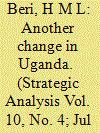

|
|
|
| 8 |
ID:
154149
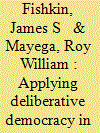

|
|
|
|
|
| Summary/Abstract |
Practical experiments with deliberative democracy, instituted with random samples of the public, have had success in many countries. But this approach has never before been tried in Sub-Saharan Africa. Reflecting on the first two applications in Uganda, we apply the same criteria for success commonly used for such projects in the most advanced countries. Can this approach work successfully with samples of a public low in literacy and education? Can it work on some of the critical policy choices faced by the public in rural Uganda? This essay reflects on quantitative and qualitative results from Uganda's first Deliberative Polls. We find that the projects were representative in both attitudes and demographics. They produced substantial opinion change supported by identifiable reasons. They avoided distortions from inequality and polarization. They produced actionable results that can be expected to influence policy on difficult choices.
|
|
|
|
|
|
|
|
|
|
|
|
|
|
|
|
| 9 |
ID:
138420


|
|
|
|
|
| Summary/Abstract |
Although there is now a wealth of scholarship concerning the onset, duration, and termination of civil wars, there is not nearly as much empirical research by political scientists on the potential for postconflict democratization in countries that have been the site of civil wars. This relative scholarly neglect of post–civil war democratization stands in contrast to the efforts and resources that other actors—foreign ministries, international and nongovernmental organizations, and members of civil society—have invested in attempting to help construct democracy in postconflict states such as Indonesia, Liberia, and Uganda.
|
|
|
|
|
|
|
|
|
|
|
|
|
|
|
|
| 10 |
ID:
138341


|
|
|
|
|
| Summary/Abstract |
Debate on the ‘securitization’ of aid and international development since 9/11 has been anchored in two key claims: that the phenomenon has been driven and imposed by western governments and that this is wholly unwelcome and deleterious for those in Africa and elsewhere in the developing world. This article challenges both of these assumptions by demonstrating how a range of African regimes have not only benefited from this dispensation but have also actively encouraged and shaped it, even incorporating it into their own militarized state-building projects. Drawing on the cases of Chad, Ethiopia, Uganda and Rwanda—four semi-authoritarian polities which have been sustained by the securitization trend—we argue that these developments have not been an accidental by-product of the global ‘war on terror’. Instead, we contend, they have been the result of a deliberate set of choices and policy decisions by these African governments as part of a broader ‘illiberal state-building’ agenda. In delineating this argument we outline four major strategies employed by these regimes in this regard: ‘playing the proxy’; simultaneous ‘socialization’ of development policy and ‘privatization’ of security affairs; making donors complicit in de facto regional security arrangements; and constructing regime ‘enemies’ as broader, international threats.
|
|
|
|
|
|
|
|
|
|
|
|
|
|
|
|
| 11 |
ID:
075218
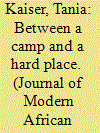

|
|
|
|
|
| Publication |
2006.
|
| Summary/Abstract |
Drawing on qualitative research with refugees in and outside formal settlements, this article challenges characterisations of Uganda's UNHCR-supported refugee settlement system as un-problematically successful. It shows that by denying refugees freedom of movement, the settlement system undermines their socio-economic and other rights. Refugees who remain outside the formal system of refugee registration and settlement are deprived of the refugee status to which they are entitled under international law. The article questions the conventional opposition between refugees living in and out of refugee settlements in the Ugandan context, revealing a more complex and interconnected dynamic than is often assumed. It suggests that those refugees with some external support may be able to escape the confines of remote rural settlements, where refugee agricultural livelihoods are seriously compromised by distance from markets, unfavourable climatic conditions, exhausted soil and inadequate inputs. It argues that refugee livelihoods face more rather than fewer challenges as exile becomes protracted, and concludes that the government and UNHCR's Self Reliance Strategy (SRS) has not yet managed to overcome the contradiction inherent in denying people freedom of movement, without supporting them effectively to meet their needs in the places to which they are restricted.
|
|
|
|
|
|
|
|
|
|
|
|
|
|
|
|
| 12 |
ID:
148948
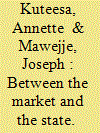

|
|
|
|
|
| Summary/Abstract |
This study assesses the capabilities of business associations for conducting meaningful policy engagements with government. Using information from 21 associations and five state institutions, this work investigates the level of autonomy and ability of business associations to coordinate and order their interests for policy decision-making. Findings reveal that the ability to organise an association's own interests is hindered by weak systems and internal structures, especially at sub-sector level. Most associations are financially weak, have limited professional expertise and experience a low level of commitment from members, which affects their capacity for autonomy. It is important that business associations create regulations to make membership ties binding, so as to strengthen their influence on policy. Associations should also be more aggressive in mobilising finances, and they should identify synergies and develop partnerships with the state to build their capacity for participating in policy-making.
|
|
|
|
|
|
|
|
|
|
|
|
|
|
|
|
| 13 |
ID:
113176


|
|
|
|
|
| Publication |
2012.
|
| Summary/Abstract |
In Uganda, as in many other African countries, increasing numbers of 15-24 year olds are migrating to urban areas to look for work and educational opportunities. We explore the shifting sense of identity amongst youth migrants in Uganda as they struggle to reconcile the differences in social norms between the rural settings in which they are brought up and the urban environment in which they now live. The experience of migration significantly impacts on the transition from youths to adults by influencing their perception of their own identity as well as the expectations of society. Young people often hold conflicting views of their rural and urban experiences, suggesting that understanding rural and urban realities as distinct entities does not reflect the complex relationship, and possible confusion, of the migrant experience. In contrast to existing literature on migrant identities, which has tended to focus on the identity shift experienced by adult transnational migrants, this reveals the particular challenges faced by youth migrants whose adult self is not yet formed.
|
|
|
|
|
|
|
|
|
|
|
|
|
|
|
|
| 14 |
ID:
088277
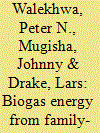

|
|
|
|
|
| Publication |
2009.
|
| Summary/Abstract |
Dependence on fossil energy sources is increasingly becoming unsustainable due to ecological and environmental problems and rapid depletion. Biogas energy could augment these conventional energy sources but despite its advantages and favourable conditions for its production, biogas energy use in Uganda remains low due to technical, economic and socio-cultural impediments. Based on primary data on households in Central and Eastern Uganda and the use of logistic regression, this study analyses factors affecting the adoption of biogas energy in Uganda. The empirical results suggest that the probability of a household adopting biogas technology increases with decreasing age of head of household, increasing household income, increasing number of cattle owned, increasing household size, male head of household and increasing cost of traditional fuels. In contrast, the likelihood of adoption decreases with increasing remoteness of household location and increasing household land area. Policy options and recommendations including educational and awareness campaigns on biogas benefits and successes, the provision of financial and non-financial incentives to households and establishment of an institutional framework could bolster wider biogas energy acceptance in Uganda.
|
|
|
|
|
|
|
|
|
|
|
|
|
|
|
|
| 15 |
ID:
081356
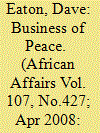

|
|
|
|
|
| Publication |
2008.
|
| Summary/Abstract |
Peace work is big business along the Kenya-Uganda border. Each year, new groups are created thanks to the generosity of major donors while others disappear due to corruption and mismanagement. This cycle has continued for decades and, despite an absence of tangible results, millions of dollars continue to flow into the bank accounts of peace groups in the North Rift. As the first part of this article suggests, the focus on the so-called 'root causes' of violence may well be responsible for the dismal performance of the peace industry. However, the behaviour of peace NGOs in the field has been appalling. Peace meetings are often only held so NGOs can display an engagement with the conflict, despite the dangers created by such events. Other groups are dominated by politicians who use money earmarked for peace work to fund their political ambitions. Better monitoring is the obvious solution, but local groups have been able to avoid this by exaggerating the security risks of visiting the region. Others argue that offloading peace work responsibilities to CBOs might lead to better results, but in the highly ethnicized North Rift smaller groups are rarely able to transcend their local roots. This article concludes that the peace industry is deeply flawed, and requires a complete overhaul in order to have a beneficial impact on the region.
|
|
|
|
|
|
|
|
|
|
|
|
|
|
|
|
| 16 |
ID:
153925
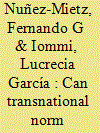

|
|
|
|
|
| Summary/Abstract |
Norm cascades often spark resistance from states under pressure to conform. Some react by further distancing themselves from the norm—a process known as “norm backlash.” We identify a particular kind of norm backlash: the creation of legal barriers aimed at fending off a transnationally diffusing norm by blocking the ability of local actors to advocate for it. We call this phenomenon “norm immunization” and provide an account of the conditions that bring it about. In this account, transnational advocacy increases the local salience of the norm, which is discursively constructed as a national threat that calls for defensive regulations against the advocacy of the threatening norm. Using this model, we analyze Uganda’s immunization against LGBT rights as instantiated in the Anti-Homosexuality Act of 2014. We find that the successful efforts of LGBT rights advocates elsewhere indeed precipitated the discursive construction of those rights as a national threat in Uganda, thereby unintentionally contributing to the adoption of the norm-immunizing law.
|
|
|
|
|
|
|
|
|
|
|
|
|
|
|
|
| 17 |
ID:
107192
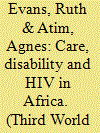

|
|
|
|
|
| Publication |
2011.
|
| Summary/Abstract |
Recent research and policy have recognised the central role of unpaid care-givers (often women and girls) in the global South. Disability rights perspectives, however, challenge the language of 'care' and 'dependence'. Drawing on qualitative research with women living with HIV and children caring for them in Tanzania, and on learning from the National Community of Women Living with HIV and AIDS in Uganda (NACWOLA), this paper explores the divergences and interconnections between the concepts and practices of care, disability and HIV in the context of East Africa. Despite the development of interdependent caring relations, both care-givers and people living with HIV in Tanzania experience 'diminished autonomy'. The participation of people living with HIV, including disabled people, in home-based care and in peer support groups, however, can enhance 'relational autonomy' for both care-givers and care-recipients. We reflect on opportunities and challenges for mutual learning and cross-movement advocacy by disabled people, people living with HIV and care-givers.
|
|
|
|
|
|
|
|
|
|
|
|
|
|
|
|
| 18 |
ID:
078432
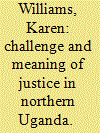

|
|
|
| 19 |
ID:
091509
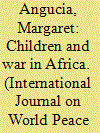

|
|
|
|
|
| Publication |
2009.
|
| Summary/Abstract |
Since the 1990s when the nature of conflict changed from interstate to intrastate, the use of children in the battlefronts and related places has become unprecedented. This paper discusses issues on children and war based on African experiences.
|
|
|
|
|
|
|
|
|
|
|
|
|
|
|
|
| 20 |
ID:
094257
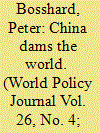

|
|
|
|
|
|
|
|